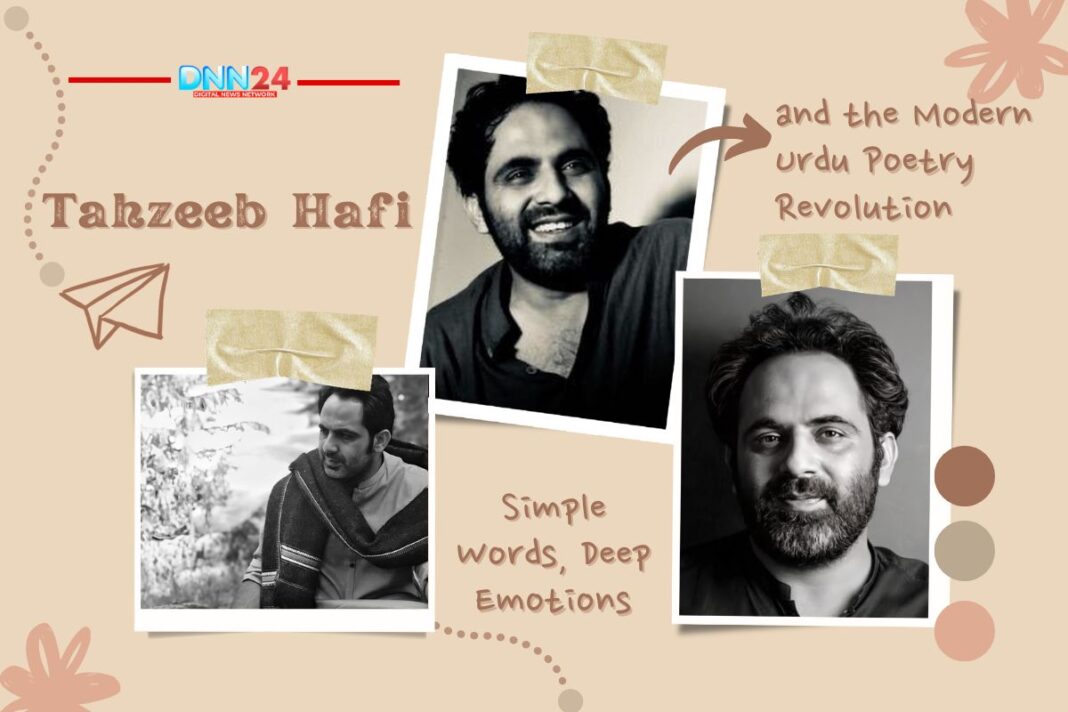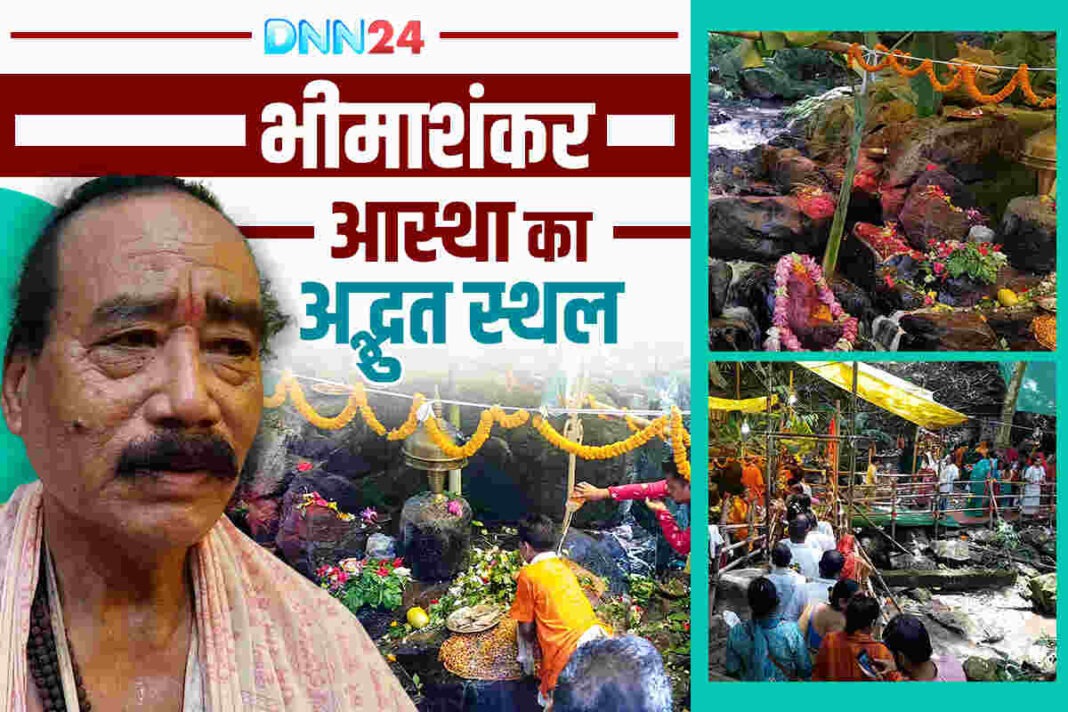Tahzeeb Hafi emerged in the Urdu poetry scene as a breath of fresh air. His verses carry no pretension, no complicated metaphors that require dictionary consultations. When listeners hear his poetry at mushairas or on social media, they immediately connect with the emotions he expresses. Born Zulfikar Hafi on 5 December 1989, in Reetda village near Taunsa Sharif in Dera Ghazi Khan District, Punjab, Pakistan, he came from a family that valued both education and creative expression.
main ki kaaghaz ki ek kashti hoon
Tahzeeb Hafi
pehli baarish hi aakhiri hai mujhe
This environment allowed him to develop intellectually while nurturing his artistic sensibilities. The combination produced a poet who thinks deeply yet communicates effectively. Young audiences across South Asia now consider him among their favourite contemporary poets, not because he impresses them with scholarly knowledge, but because he articulates feelings they recognise from their own lives.
tera chup rehna mere zehan mein kya baith gaya
Tahzeeb Hafi
itni aawaazen tujhe di ke gala baith gaya
His approach to poetry rejects the notion that complexity equals depth. Instead, he demonstrates that simple language can carry profound meaning when it comes from genuine emotional experience. The popularity he enjoys today stems from his consistent and honest work, rather than calculated image-building.
Education Journey from Engineering to Literary Mastery
The path Tahzeeb Hafi took through higher education reveals essential aspects of his character and artistic development. Initially, he pursued software engineering at Mehran University, opting for a practical field that offered stable career prospects. The technical discipline taught him structured thinking, problem-solving, and attention to detail. These skills later influenced how he constructed his verses, ensuring that emotional expression maintained coherent form.
tujh ko paane mein masla ye hai
Tahzeeb Hafi
tujh ko khone ke vasvase rahenge
However, the engineering classes never fully satisfied his creative hunger. Poetry remained a constant presence in his thoughts, demanding more attention than a hobby status allowed. The academic environment exposed him to various schools of thought within Urdu poetry, helping him locate his own voice within this rich tradition. University discussions with professors and fellow students sharpened his critical thinking about poetry as both an art form and a means of communication.
apni masti mein bahta dariya hoon
Tahzeeb Hafi
main kinaara bhi hoon bhanvar bhi hoon
The transition from engineering to Urdu studies raised questions among some family members and friends, who wondered about the practicality of the career. His commitment to following his authentic calling rather than taking the safer path demonstrated courage that later characterised his poetic voice. Today, the blend of technical training and literary education makes his work distinctive, bringing systematic thinking to emotional expression in ways that create memorable, well-crafted verses.
The Personality That Matches the Poetry
Meeting Tahzeeb Hafi in person confirms what his poetry suggests about his character. His demeanour carries the same simplicity and genuineness that characterise his verses. The smile appears natural rather than practised for public appearances. When speaking with others, whether fans or fellow poets, he maintains a conversational tone that puts people at ease. This approachability extends to his performance style at mushairas, where he avoids theatrical gestures or dramatic voice modulations.
ye ek baat samajhne mein raat ho gayi hai
Tahzeeb Hafi
main us se jeet gaya hoon ki maat ho gayi hai
The verses speak for themselves without requiring elaborate presentation techniques. Audiences appreciate this understated approach because it keeps focus on meaning and emotion rather than performance spectacle. His refusal to construct an artificial public persona builds trust with listeners who value authenticity in an era dominated by carefully managed celebrity images. The consistency between his private character, public behaviour, and poetic content creates credibility that cannot be manufactured through marketing strategies.
daastaan hoon main ek taweel magar
Tahzeeb Hafi
tu jo sun le to mukhtasar bhi hoon
Young fans, in particular, value this genuineness because it makes his success feel achievable rather than dependent on insider connections or image manipulation. His face reflects innocence and openness that immediately communicate his approachable nature. When he discusses poetry, literature, or life experiences, the observations come across as thoughtful reflections rather than prepared statements. This natural quality makes every interaction feel meaningful, whether he addresses thousands at a mushaira or responds to individual comments on social media platforms.
From Anonymous Text Messages to Recognised Voice
Tahzeeb Hafi began writing poetry seriously approximately eighteen or nineteen years ago, during a period when mobile phones relied primarily on SMS text messaging for communication. Friends regularly exchanged messages containing jokes, inspirational quotes, and poetry verses found from various sources. One day, feeling creative, he composed an original couplet and sent it to his friends without identifying himself as the author.
wo jis ki chhaav mein pachchees saal guzre hain
Tahzeeb Hafi
wo ped mujh se koi baat kyun nahi karta
Their enthusiastic response surprised him. They discussed the verse’s meaning, praised its emotional impact, and forwarded it to their own contacts. Gradually, as he wrote more and began sharing verses with his name attached, people started recognising his distinctive voice. The transition from anonymous writer to acknowledged poet happened organically rather than through deliberate self-promotion. This gradual development allowed him to refine his skills without the pressure of early public attention.
bata ai abr musavaat kyun nahi karta
Tahzeeb Hafi
hamare gaanv mein barsaat kyun nahi karta
The foundation built during those private years of practice gave him confidence when larger audiences eventually discovered his work. His approach to poetry remained consistent throughout this evolution, focused on honest emotional expression rather than achieving fame or building a following.
Success on the Mushaira Circuit
Tahzeeb Hafi now performs regularly at major mushairas throughout Pakistan and is increasingly invited to international events where Urdu poetry enthusiasts gather. His presence creates anticipation because audiences know his verses will offer genuine emotional content rather than recycled traditional themes. The mushaira culture in Pakistan underwent significant changes during his career. Earlier, organisers expected poets to perform without financial compensation, treating participation as honour enough.
tamam naakhuda saahil se door ho jaayein
Tahzeeb Hafi
samundaron se akele mein baat karni hai
Tahzeeb estimates performing at sixty to seventy mushairas without receiving payment, viewing these as opportunities to develop stage presence and connect with diverse audiences. As poets began advocating for fair compensation and audiences supported professional treatment of literary artists, the situation gradually improved.
main janghalon ki taraf chal pada hoon chhod ke ghar
Tahzeeb Hafi
ye kya ke ghar ki udaasi bhi saath ho gayi hai
The digital age transformed how mushairas reach people, with recordings circulating widely on social media platforms, introducing his work to millions who never attend live events. This expanded reach creates interesting dynamics where poets develop international reputations before physically visiting certain countries. Indian fans regularly express their desire to see him perform live, creating cross-border cultural connections that transcend political tensions between the nations.
The Deep Connection with Indian Audiences
Tahzeeb Hafi enjoys remarkable popularity throughout India, often matching or exceeding his recognition in Pakistan. Indian audiences discovered him primarily through social media, where his verses spread organically, without the need for formal marketing campaigns or promotional tours. This grassroots growth demonstrates the power of authentic artistic expression to find audiences naturally. Fans create dedicated pages, share his poetry with commentary, and organise online discussions exploring meanings and personal connections to specific verses.
main jis ke saath kai din guzaar aaya hoon
Tahzeeb Hafi
wo mere saath basar raat kyun nahi karta
In various interviews, he speaks warmly about the Indian appreciation, noting that Indian audiences provide detailed and thoughtful feedback about his work. This level of engagement satisfies any artist because it confirms that people truly listen and think deeply about the poetry. He expresses a sincere interest in visiting India, specifically mentioning Delhi, Lucknow, Bihar, Punjab, and Maharashtra as places he wants to experience. Delhi represents the historical centre of Mughal culture and Urdu literary traditions.
sahra se ho ke baagh mein aaya hoon sair ko
Tahzeeb Hafi
haathon mein phool hain mere paanv mein ret hai
Lucknow is renowned for its refined cultural sensibilities and a distinctive Urdu dialect. Bihar hosts passionate poetry audiences known for enthusiastic participation at mushairas. Punjab offers a shared cultural heritage between India and Pakistan. Maharashtra presents vibrant artistic communities in cities like Mumbai. Each location represents different dimensions of Indian culture that he wishes to explore personally.
Personal Reflections and Views on Marriage
When interviewers ask about his personal life, Tahzeeb Hafi responds with humour that reveals his personality while deflecting excessive prying. He remains unmarried, which generates constant unsolicited advice from well-wishers, fans, and even casual acquaintances. Some people encourage marriage, suggesting that family life brings stability and new perspectives, which can enrich their creative work.
is liye raushni mein thandak hai
Tahzeeb Hafi
kuchh chiraaghon ko nam kiya gaya hai
Others advise against it, warning that domestic responsibilities might distract from poetry or dilute the emotional intensity that fuels his verses. He jokes about following the majority opinion, noting that those advising against marriage currently outnumber the advocates of marriage.
neend aisi ki raat kam pad jaaye
Tahzeeb Hafi
khwaab aisa ki munh khula reh jaaye
The humour continues when he playfully suggests that finding a good wife might damage his poetry, playing on the traditional association between poetic inspiration and romantic longing or dissatisfaction. This comment, delivered with apparent self-awareness, references the old notion that poets draw creative energy from unfulfilled desires rather than contentment.
Legacy and Future Impact on Urdu Poetry
Tahzeeb Hafi has established himself as a significant voice in contemporary Urdu poetry, with many productive years ahead for continued development and impact. His success demonstrates that traditional art forms remain vital when practitioners understand both classical foundations and contemporary communication methods. Young poets now study his work as a model for balancing authenticity with accessibility, demonstrating that artistic integrity and popular appeal can coexist.
mujh pe kitne saanehe guzre par in aankhon ko kya
Tahzeeb Hafi
mera dukh ye hai ke mera hamsafar rota na tha
By consistently prioritising honest emotional expression over trend chasing or deliberate image cultivation, he built trust with audiences that forms the foundation for lasting influence rather than temporary celebrity. As Urdu poetry continues evolving in the digital age, voices like his ensure the tradition adapts to modern life while maintaining its essential character and emotional depth.
Also Read: Deep Narayan Nayak: Teacher of the Street Who Turned Walls into Blackboards
You can connect with DNN24 on Facebook, Twitter, and Instagram and subscribe to our YouTube channel.



